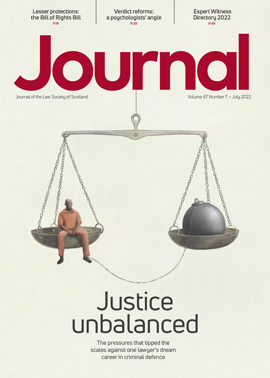Licensing: Minimum pricing – a genuine impact?

“Minimum unit price is not changing alcoholics’ habits”, and “Minimum unit price causes poorest to cut back on food”, were just two examples of headlines last month following the publication of a new Public Health Scotland report from a study by the University of Sheffield, the University of Newcastle in Australia and Figure 8 Consultancy Services.
Although the Scottish Government’s minimum unit pricing (“MUP”) policy sought to address alcohol consumption at harmful levels, the report concluded that there was no clear evidence of a change in consumption or severity of dependence following the introduction of the controversial measure. In addition, the increased expenditure on alcohol required some economically vulnerable groups to cut back on essentials like food and utilities to support their addictions.
For those critical of the policy this came as little surprise: opponents had predicted that higher pricing would hit those who most need support and who were unlikely to respond with a reduction in alcohol consumption. However, despite the report’s findings, Alcohol Focus Scotland, a leading proponent of MUP, claimed that there were positives to be drawn. The charity has already urged the Scottish Government to increase the minimum unit price from 50p to 65p.
In terms of a sunset clause in the Alcohol (Minimum Pricing) (Scotland) Act 2012, its provisions will terminate on 30 April 2024 unless the Scottish Parliament votes in favour of their continuation. A detailed evaluation of the policy – due to be completed by 30 April 2023 – will be central to that decision. In the meantime we can expect to see MUP and its impact in tackling alcohol abuse attract many more headlines.
Price and overprovision
Two months ago, MUP grabbed headlines for a different and wholly unexpected reason as the deciding factor in a licensing appeal. Aldi Stores Ltd applied to the Dundee City Licensing Board for a provisional premises licence for a new store in Broughty Ferry. The application was refused on the basis of the board’s overprovision policy, which seeks to halt the growth of off-sales outlets in the city. In the ensuing appeal before Sheriff Lindsay Foulis, Aldi sought to assail the board’s approach on a number of grounds; but only one argument secured its victory. The exclusion of price from the board’s consideration was fatal to the board’s approach.
The policy sought to address alcohol-related harms in the board’s area having regard to two principal considerations flagged in a report by the local Alcohol & Drugs Partnership: availability and price. Nevertheless, although at the time of the refusal of Aldi’s application (14 January 2021), MUP had been in operation for some 30 months, the matter of price had not been taken into account. In the result, Sheriff Foulis found in favour of Aldi, remitting the case to the licensing board for reconsideration in the light of his judgment.
A question arises as to whether the decision will oblige other licensing boards to revisit their policy statements and consider price as a factor when formulating new policies. Sheriff Foulis considered that “The production of a Scottish Government report in due course” did not preclude a local exercise. MUP was a national measure but it nevertheless operated locally. However, one might think that conducting local research leading to robust and unassailable conclusions would amount to a lengthy and complex process, particularly in the shadow of the statutory evaluation. In any case, the Aldi judgment turns very much on the policy background and the prominence of price as a material consideration.
Leaving the matter of price to one side, there is one passage in the sheriff’s judgment that appears to disclose a palpable error. He considered that, when the board revisited the application, it might take “demand” into account, noting the existence of a local Sainsbury’s superstore as well as the possibility of drawing custom from the Angus Council area. Such an approach would depart from the statutory guidance issued to licensing boards by Scottish ministers. Paragraph 49 of the guidance enjoins boards not to take into account a number of matters, including “the need or demand for licensed premises in the locality”.
Footnote: Aldi’s application came before the board again on 30 June and was granted. Senior counsel for Aldi submitted that, for the moment, there was no overprovision policy, a view which the board felt obliged to accept.
Perspectives
Features
Briefings
- Civil court: Issues on appeal
- Licensing: Minimum pricing – a genuine impact?
- Insolvency: How to admit joint creditor claims
- Tax: windfall and plastic packaging taxes raise stakes
- Immigration: Asylum system overhauled
- Scottish Solicitors' Discipline Tribunal: July 2022
- In-house: In with the stonework
- Property: Living with the Register of Overseas Entities
In practice
- OPG update: July 2022
- Public policy highlights: July 2022
- Gear up for the Scottish Legal Walks
- Disabled solicitor support group proposed
- Risk: Cybercrime – the hybrid worker prey
- Ask Ash: Piling it on
- TRS: time for a trusts trawl
- Know people, know business
- High street and hybrid
- Appreciation: Ian Leslie Shaw Balfour
- The Expert Witness Directory 2022
- Expert witness: case law update







